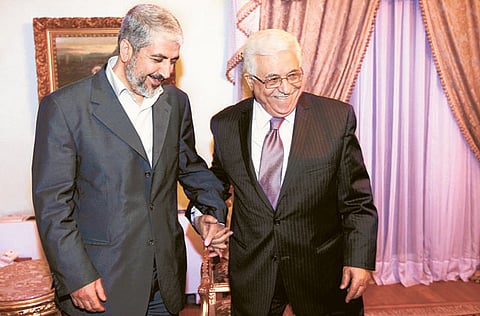Hamas reaches out to moderates
Electoral gains of Islamists post-Arab Spring inspires group to work with Fatah

Occupied Jerusalem: Buoyed by the success of Islamist movements in countries swept by the Arab Spring, Hamas is showing signs of pragmatism as its sense of isolation fades. The group that rules the Gaza Strip is jockeying to reposition itself amid shifting terrain in the Arab world.
Hamas is reported to be scaling down its presence in Syria, where President Bashar Al Assad is facing a popular uprising. At the same time, it is seeking to strengthen ties with Arab countries where moderate Islamists have made political gains.
Hamas officials are holding talks in Cairo this week with the rival Palestinian faction, Fatah, on implementing a reconciliation accord reached earlier this year, as some leaders of the organisation suggest that it is ready for political pluralism at home and limiting violence against Israel.
Esmail Haniyeh, the Hamas prime minister in Gaza, is planning his first official trip outside the territory since the group seized power there in 2007. According to an aide, Haniyeh plans to visit Turkey, Bahrain, Qatar and Tunisia.
Confidence boost
The Islamist surge, say Hamas officials and analysts, has boosted the group's confidence, giving it more room to manoeuvre. "This is an Islamic area, and once people are given a fair chance to vote for their real representatives, they vote for the Islamists," said Mahmoud Zahar, a senior Hamas leader in Gaza, referring to the ascendance of Islamist parties in recent elections in Egypt, Tunisia and Morocco. "We feel strengthened by popular support."
For Hamas, a sense of validation has replaced a siege mentality after years of international boycott and blockade by Israel and by Egypt under former president Hosni Mubarak.
"The rise of the Islamists could be seen as game-changer for Hamas," said Fawaz Gerges, director of the Middle East Centre at the London School of Economics. "Hamas no longer sees itself as a besieged island in a sea of hostility. This goes to the very psychology of the movement ... They feel that they have strategic depth now."
On the domestic front, this has translated into a declared intention of following the model of the Islamist parties abroad, which have shown readiness to share power with secular and liberal parties in governing coalitions.
The example of the Islamist parties has had an impact on Hamas leaders and "opened their eyes to make coalitions with other Palestinian factions," said Gazi Hamad, deputy foreign minister of the government in Gaza. "This will create a new political Islam in which a coalition is the main goal, not to monopolise the regime. No one accepts one political colour. The time of one-party rule has passed."
The reconciliation talks with Fatah will be a key test of Hamas's willingness to share power. Mkhaimar Abu Sada, a political scientist at Al Azhar University in Gaza, said that the example of the Muslim Brotherhood in Egypt would be critical.
"The Muslim Brotherhood understands the limitations attached to becoming a governing party, and there is a moderation in their political discourse," Abu Sada said. "If the Muslim Brotherhood is saying now that they are willing to respect Egypt's agreements with other countries and are not going to impose Islamic law, that would inspire Hamas to imitate their practice in Gaza."
Egypt's agreements include the 1979 peace treaty with Israel.
On the political front, there have been signs of flexibility on a key issue that has divided Hamas and Fatah: the use of arms in the confrontation with Israel.
Mode of resistance
Hamas continues to assert the right to armed action, a position affirmed recently by Haniyeh in a speech marking the anniversary of the group's establishment, in which he said that "armed resistance" was "the only way to liberate our land from the sea to the river."
However, Khalid Mesha'al, the leader of Hamas, recently raised the option of "popular resistance," a term for the unarmed protests that Palestinian National Authority President Mahmoud Abbas has encouraged in the West Bank.
In an interview last month, Mesha'al suggested that "popular resistance" could become an agreed-on formula between Fatah and Hamas for conducting the confrontation with Israel. "We believe in armed resistance," he said, "but popular resistance is a programme which is common to all the factions."
Hamad noted that Hamas has largely enforced a ceasefire with Israel. "Armed struggle is our right," he said. "How we use it, and when we use it, is something different."
Sign up for the Daily Briefing
Get the latest news and updates straight to your inbox


